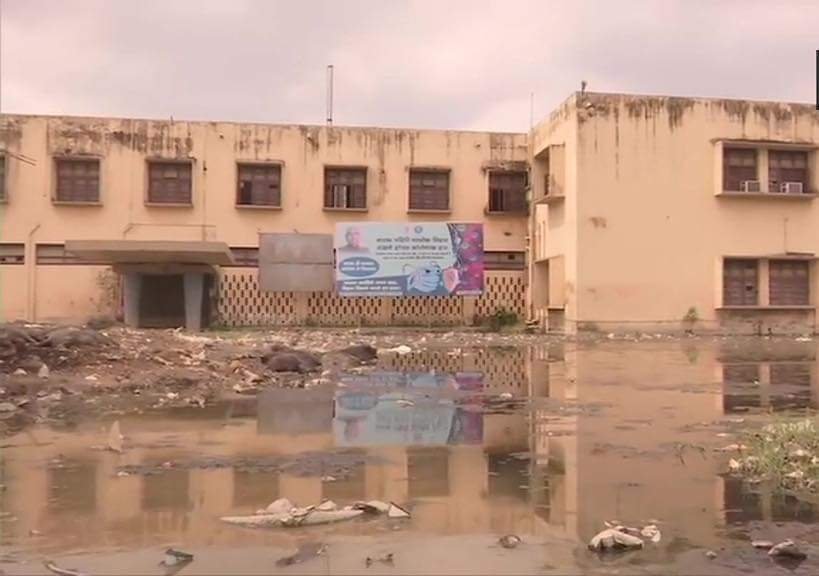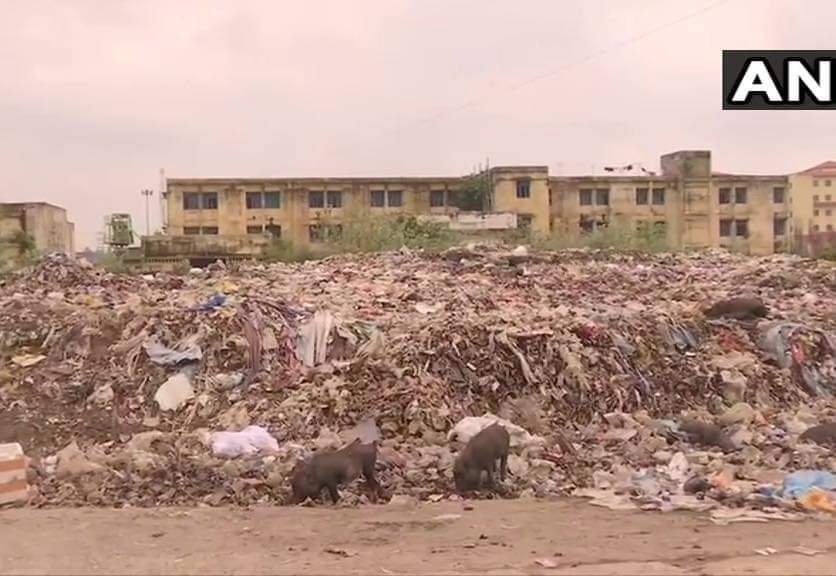I am Rupam Dev, from Darbhanga. I am an Aripana Education Fellow. I support the environment and sustainability education program at Aripana Foundation and other programs. Since past two months I am engaging intensively with issues of waste and sustainability and supporting various schools of Darbhanga to understand the issue of waste in Darbhanga.
When I was asked if I would like to write a blog for our website, I wanted to write about waste problem of Darbhanga and decided to write about the Darbhanga Medical College and Hospital, also known as DMCH.
There has been a fresh start to manage the garbage at DMCH, Darbhanga. But will it be consistent? I wonder!
DMCH, the establishment, is Darbhanga’s hope! It is a government medical college having hospital facilities that was established in 1946. It is one of the largest hospitals in North Bihar where large numbers of people come from many adjoining districts and even from our neighbouring country Nepal, for their treatment. Some old parts of DMCH still exist and some new construction has also been added.
It’s raining heavily in Darbhanga, Mithila (North Bihar) now-a-days (July). Water is accumulating around the existing big garbage dumps, in the DMCH campus. Street dogs, pigs regularly feed on the accumulated garbage. In front of DMCH, road blockages happen because of flooding which happens because of choked drains, creates difficulties for local people, patients,vehicles and even ambulance. In Darbhanga city where the problem of improper waste management is all around, how can DMCH be any different? It is aspiring to be a premier institution in medicine while struggling to take care of its own garbage. The reasons for improper waste management in Darbhanga could be lack of awareness in citizens, lack of implementation of segregation of waste which is important for waste management, lack of proper planning for waste disposal etc. Same are challenges for DMCH.

The garbage dumps in the DMCH campus are especially dangerous as they are filled with infectious biomedical waste. The surrounding soil is getting polluted with bio medical waste and as the region is prone to heavy rain fall, situation is dire. No smooth outlet for rainwater exists, resulting in severe water logging in the campus leading to the general and emergency wards getting flooded. This is very common sight during the monsoon.

The rain will stop, seasons will change, but can there be some change in the situation of DMCH campus that my eyes will have seen? As far as I see, the condition of DMCH is getting worse day by day.
There has been effort from the hospital’s side to provide all facilities to the patients. It is so commendable for a city like Darbhanga! But what about their own garbage and its management? The environment of a hospital and medical college should ideally be hygienic. But here, most of the open and empty campus of DMCH campus is being treated as dumping ground for all kinds of waste. The Municipal Corporation has also not been able to find a solution.
Now a days,some changes have been observed. We hear that some of the biomedical waste disposed by hospital is being managed after the DM of Darbhanga, in a letter to the Municipal Corporation, ordered so. It is possible that DMCH has registered with Medicare Environmental Management private limited, Muzaffarpur, for collection of biomedical and surgical waste. This private company provides red, blue, yellow and black dustbins along with black garbage bags for effective segregation of waste such as:
Yellow dustbin: For used cotton, gauze, bandages and other objects that come in contact with body fluids, human body parts, placenta etc.
Blue dustbin: For glass bottles, broken and intact and discarded medicines.
Red Dustbin: Plastic waste such as catheters, injection, syringes, tubings, IV bottles etc.
Black dustbin: All sharp metal objects like blades, needles etc.
I will be very interested to know if staff has been supported to understand this and is able to use these dustbins effectively. Education, awareness and support is very important if new ideas have to be successful.
There are examples of government medical colleges / hospitals improving their waste management practices. Eg: The King George’s Medical University (KGMU), Lucknow worked hard for over two and a half years, with support from a UNDP project and from being an institution without any effective waste management programme became a model institution for sound bio-medical waste management. Initially, sweepers and waste pickers were given the task of burning the hospital’s infectious waste etc. in an open pit. But then, after education and awareness and support, one of the changes that happened was that bio-medical waste started being segregated from other wastes thereby reducing risk of infection of rest of the non infectious waste. This waste was then sterilized and made fit for recycling. Waste was no longer burnt.
The present situation seems to be improving with Medicare picking up the surgical and biomedical waste but no solution can be seen for the garbage dumps already spread in DMCH premises. It continues to pollute the ground and air and water.
Waste management is a big challenge for DMCH and Municipal Corporation. I hope greater awareness and facilities help this institution to tackle this problem. If that is done, DMCH will truly be pride of Darbhanga.
Rupam Dev
Aripana Education Fellow

